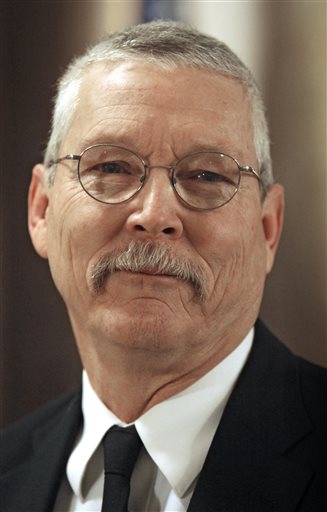
By KANTELE FRANKO
FILE- In this Feb. 27, 2013, file photo, fired Mount Vernon, Ohio public school science teacher John Freshwater stands in the lobby of the Ohio Supreme Court in Columbus, Ohio before his hearing. On Tuesday, Nov. 19, 2013, Ohio’s highest court says the school district was legally justified in firing Freshwater, who refused orders to remove classroom displays of religious materials. (AP Photo/The Columbus Dispatch, Tom Dodge, File) MANDATORY CREDIT; NO SALES
COLUMBUS, Ohio (AP) — A public school district was legally justified in firing a science instructor who refused to remove religious materials from his classroom, a divided Ohio Supreme Court said Tuesday in a ruling that stopped short of addressing issues the case raised about the teaching of creationism and intelligent design.
With three justices dissenting, the court ruled the Mount Vernon district had grounds to fire John Freshwater in 2011 for insubordination for keeping religious books and a poster of a praying president.
“Freshwater is fully entitled to an ardent faith in Jesus Christ and to interpret Biblical passages according to his faith. But he was not entitled to ignore direct, lawful edicts of his superiors while in the workplace,” Chief Justice Maureen O’Connor wrote in the lead opinion, which affirmed lower court rulings.
Freshwater’s Virginia-based attorney, Rita Dunaway, said she was disappointed but couldn’t comment further because she hadn’t talked with Freshwater about the decision or possible next steps.
The court concluded the district infringed on Freshwater’s First Amendment rights by ordering the removal of his personal Bible from his desk but found he was insubordinate for keeping other items that were not part of his exercise of religion.
The dissenting justices contended the evidence did not support the firing. Keeping the poster, which was distributed by the school, and the other books, which were borrowed from the library, didn’t amount to insubordination, said Justice Paul Pfeifer, whose separate dissenting opinion chided the court for not addressing remaining constitutional issues in the case.
“Instead, the majority walks away from the opportunity to provide helpful guidance to every school board in Ohio and to the thousands of great teachers who could benefit from knowing more about the extent of and limits on their academic freedom,” he wrote.
The lead opinion said the court didn’t need to address the extent to which Freshwater had the right to push his religious beliefs in class because the insubordination alone was enough to justify his firing.
A lawyer for the school board had said Freshwater waved a Bible at his students, distributed religious pamphlets and talked about creationism in evolution lessons, violating the constitutional separation between church and state. Messages were left Tuesday for the superintendent and attorneys for the school district, about 40 miles northeast of Columbus.
Dunaway had argued that accounts of Freshwater’s conduct were exaggerated and that he was exercising academic freedom to explore controversial ideas.
Freshwater was dismissed after investigators reported he preached Christian beliefs in class when discussing topics such as evolution and homosexuality and didn’t remove religious materials as ordered. He also was accused of using a science tool to burn students’ arms with the image of a cross, but that allegation was resolved and wasn’t listed as a factor in his firing.



